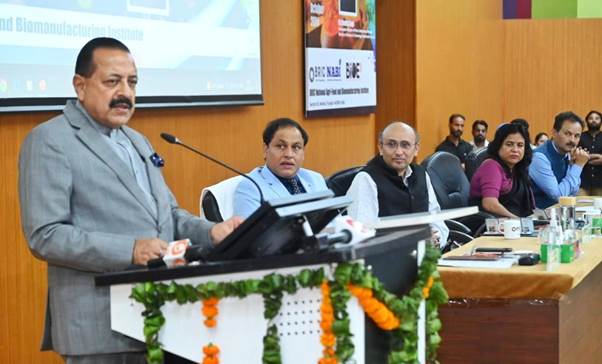Dr. Jitendra Singh, Union Minister of State for Science and Technology, Earth Sciences, and other key portfolios, inaugurated the new complex of India’s first biomanufacturing institute—BRIC-National Agri-Food Bio-Manufacturing Institute (BRIC-NABI). The facility aims to transform India’s agri-food sector through advanced biotechnology, contributing to Prime Minister Narendra Modi’s vision of a “Viksit Bharat”.
Addressing a gathering of scientists, industry leaders, and stakeholders at the event, Dr. Singh highlighted the government’s commitment to fostering innovation in agriculture, generating employment, and promoting environmental sustainability. These goals are vital to building a future-ready India.
Dr. Singh underscored the importance of science and technology within the Modi government’s priorities, citing the launch of the BioE3 policy, which emphasizes biotechnology’s role in boosting the economy, employment, and the environment. “Biotechnology and synthetic production will not only transform agriculture but will also redefine India’s position in global scientific advancement,” he said.
He also said that India is one of the first countries to implement an exclusive biotechnology policy. This shift will promote sustainable, eco-friendly solutions, allowing India to move from traditional manufacturing to synthetic production using advanced, cost-effective technologies. He credited India’s economic rise from being one of the “fragile five” economies to becoming one of the world’s top five economies to the government’s focus on science-driven growth.
The newly inaugurated BRIC-National Agri-Food Bio-Manufacturing Institute is the result of a strategic merger between the National Agri-Food Biotechnology Institute (NABI) and the Center of Innovative and Applied Bioprocessing (CIAB). The institute aims to bridge the gap between research and commercialization, facilitating pilot-scale production and bringing innovative agricultural technologies to the market.
Dr. Singh emphasized that this consolidation will enhance agricultural research and development, leading to the creation of high-yield, disease-resistant crops, as well as biofertilizers and biopesticides. These advancements align with the government’s goal of doubling farmers’ income and promoting sustainable farming practices.
One of the key features of the new institute is the establishment of the BioNest Incubation Centre. This collaborative hub is designed to support startups in agriculture, food, and bioprocessing sectors, helping young entrepreneurs, women, and farmers access industry partnerships and innovation networks. The incubation center aims to accelerate the commercialization of agri-food innovations and foster inclusive economic growth.
Dr. Singh stressed the importance of private sector involvement, urging industry players to invest in such initiatives to unlock market potential and generate sustainable employment for India’s youth. He framed the BioNest initiative as part of the broader “Make in India” vision, which promotes self-reliance and industrial growth.
Looking ahead, Dr. Singh announced the launch of Biomanufacturing Workshop 1.0, scheduled for December 2024. The workshop will focus on applications of biomanufacturing across agriculture, food, pharmaceuticals, and energy sectors, providing insights into cutting-edge techniques that leverage biological systems for sustainable production. The event will cater to researchers and industry professionals, reinforcing the objectives of the BioE3 policy and India’s commitment to eco-friendly innovation.
During his address, Dr. Singh also raised concerns about the brain drain of Indian scientists. He urged young researchers and entrepreneurs to stay in India, highlighting the country’s growing scientific ecosystem, which he argued now rivals global institutions. He said that building indigenous expertise would strengthen India’s global influence in science and innovation.
The inauguration of the BRIC-National Agri-Food Bio-Manufacturing Institute marks a significant milestone in India’s journey toward a science-powered economy. With initiatives like BioE3 and BioNest, India aims to position itself as a global leader in knowledge and innovation, contributing to sustainable growth both domestically and internationally.














